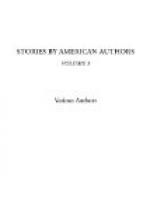“Continue firing, and keep right for him.”
“Shall we ram him, sir?”
“Yes, sir; as straight amidships as you can.”
The “Franklin” now poured in her fire with all possible rapidity; but it was evident that her shot made little or no impression on the massive iron shield of her antagonist, although it played havoc amid his rigging. Another fact now became apparent—that the Spaniard was much the faster vessel of the two; for he was evidently nearing the “Franklin” more quickly than the “Franklin” was approaching him.
“Do you know who that ship is?” asked the admiral.
“The ‘Numancia,’ sir,” replied the captain; “her armament is immensely better than ours. She has twenty-five Armstrong guns.”
Crash! crash! Two more shells struck the wooden hull of the “Franklin” between the fore and mainmasts, tearing a great rent in her side and literally annihilating the crews of four guns.
“There is three feet of water in the hold, sir and it is gaining!” shouted the carpenter at the pump-well.
Men were sent at once to the pumps.
Crash! This time a double explosion, followed by dense clouds of steam. Men, scalded and horribly burned, climbed up the ladders from below.
“Our boilers are gone,” reported the captain.
“Keep her broadside toward the enemy, sir,” returned the admiral.
The guns of the “Franklin” were now firing slowly. Their smoke overhung the vessel so that the Spaniard could not be seen, but the reports of his cannon sounded closer and closer.
Suddenly the huge prow of the “Numancia” loomed up close aboard the “Franklin.”
“Starboard! Hard a starboard!” shouted the admiral.
It was too late. There was no one at the helm. A shell, bursting close to the wheel, had killed the helmsman, and a fragment had buried itself in the captain’s breast.
The admiral himself turned to go toward the wheel, but suddenly staggered and pitched forward, dead.
Then came the frightful explosion of the “Numancia’s” bow-torpedo, striking the ill-fated frigate; and then the crushing and splintering of timbers under the fearful stroke of the ram.
Five minutes afterwards the Spanish war-ship was alone. Slowly the “Franklin” sank—her lofty mast-heads going under with the stars and stripes still proudly floating from them. The “Numancia” lowered her boats to pick up survivors. They returned with one officer and two seamen—all that remained of the crew of nearly one thousand souls.
The American flag ship had been sunk by a fourth-rate European ironclad—the first practical proof of the miserably short-sighted policy of a nation of fifty millions of inhabitants, with an enormous coast line and innumerable ports to be protected, relying for its safety upon a navy the fifty-five available vessels of which are too slow to run away, and too lightly armed and too weakly built to defend themselves.




